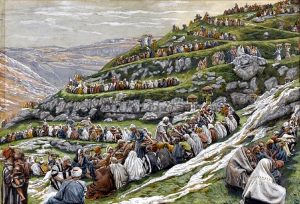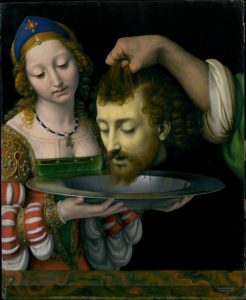Thoughts on Sunday’s Lessons for July 14, 2024 (Pentecost 8B/Proper 10)

Feast of Herod with the Beheading of St John the Baptist (1633), oil painting on canvas by Bartholomeus Strobel (c.1630-1643). Prado Museum, Madrid. (Click image to enlarge.)
First Reading (Track One): 2 Samuel 6:1-5, 12b-19
King David’s story in Second Samuel continues. David now reigns over the two kingdoms of Israel and Judah. It is a moment for joy as the Ark of the Covenant, which had been in the hands of the Philistine enemies, returns to Jerusalem. This portable shrine, which the people had built in the desert as a holy throne for God, stood at the heart of Israel’s worship. Its return was greeted with celebration, music and dancing; David himself leaped and danced with all his might. In one curious verse, though, we discover that Saul’s wife, Michal, saw him dancing and “despised him in her heart.” What was that about? Later verses suggest that Michal didn’t think that David was decently dressed during his dance in front of all the people of Israel.
First Reading (Track Two): Amos 7:7-15
As the Prophet Amos and John the Baptist each learned from experience, prophesying can get you in trouble even though you’re simply repeating God’s message. Amos, a humble shepherd and sycamore tender, never expected to become a prophet. But when God called him to warn Israel’s leaders that their God had measured them and found them wanting, Amos responded. When Amos warned King Amaziah to expect destruction and exile, the angry king told Amos to get out of his sight, to go back where he came from. Amos learned, as John the Baptist would discover some six centuries later, that prophecy was dangerous and could get him killed. But both prophets heard God’s call and could not refuse.
Psalm (Track One): Psalm 24
Psalm 24 is one of the many that tradition attributes to King David himself. It was likely intended as a processional chant to be sung responsively as the priests and congregation approached the Temple. The priest calls out, “And who shall stand in his holy place? Who has the right to come in and worship?” “Those who have clean hands and pure hearts,” the crowd sings back, awaiting the protection of God, the King of Glory, creator of the earth and all that is in it.
Psalm (Track Two): Psalm 85:8-13
This beautiful passage from Psalm 85 offers us a gentle pause between the anger in Amos and the violence of John the Baptist’s death. God will speak peace to the people; the faithful people will hear peace. When Heaven and Earth meet in truth and righteousness, righteousness and peace share a tender kiss. God grants prosperity and a fruitful harvest, truth springs up, and righteousness goes before.
Second Reading: Ephesians 1:3-14
After almost two months reading through Second Corinthians, our second readings now turn to the letter to the Ephesians for the next six weeks. A letter most likely written to the people of Ephesus in Paul’s name by a later follower around the end of the first century, it addresses an early Christian community that faced persecution. Some of its chapters include difficult passages (which we won’t hear in our Lectionary readings) that urge wives to submit to their husbands and slaves to obey their owners. Today’s reading, though, from the introductory verses, focuses on grace as God’s free gift through Jesus. We also catch a glimpse of an evolving theology: that Christ was present with God even before the creation of the Earth.
Gospel: Mark 6:14-29
When King Herod learned about the healings and miracles that Jesus and his apostles were performing in Galilee, he was both angry and afraid. In a quick Gospel flashback, Mark recalls the gory story about how Herod, at the insistence of his new wife and her daughter, ordered John beheaded and his head brought in on a platter. Now rumors are swirling about Jesus and his healing and teaching. Is he Elijah? Or a new prophet? Herod himself wonders, fearfully musing, “John, whom I beheaded, has been raised.”


